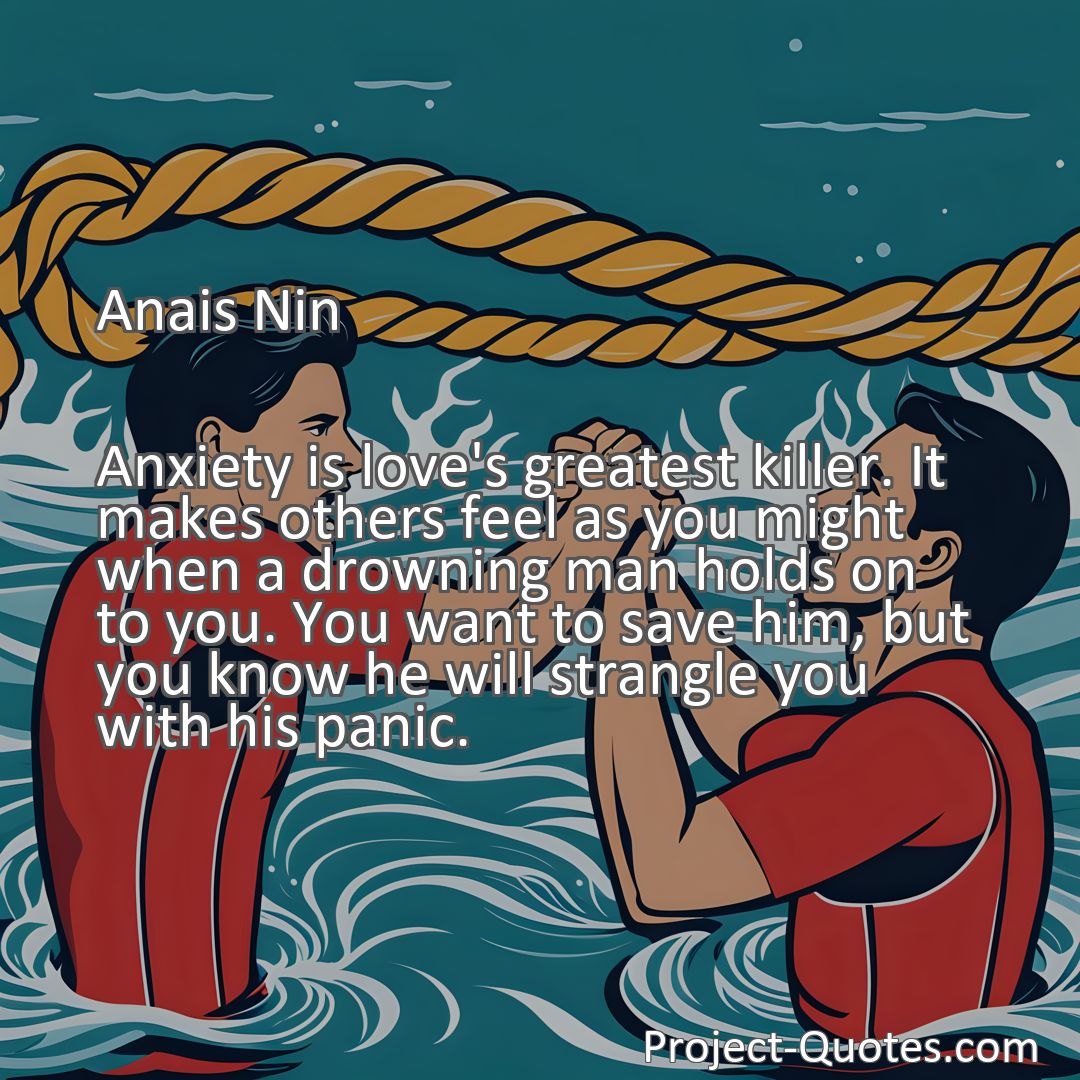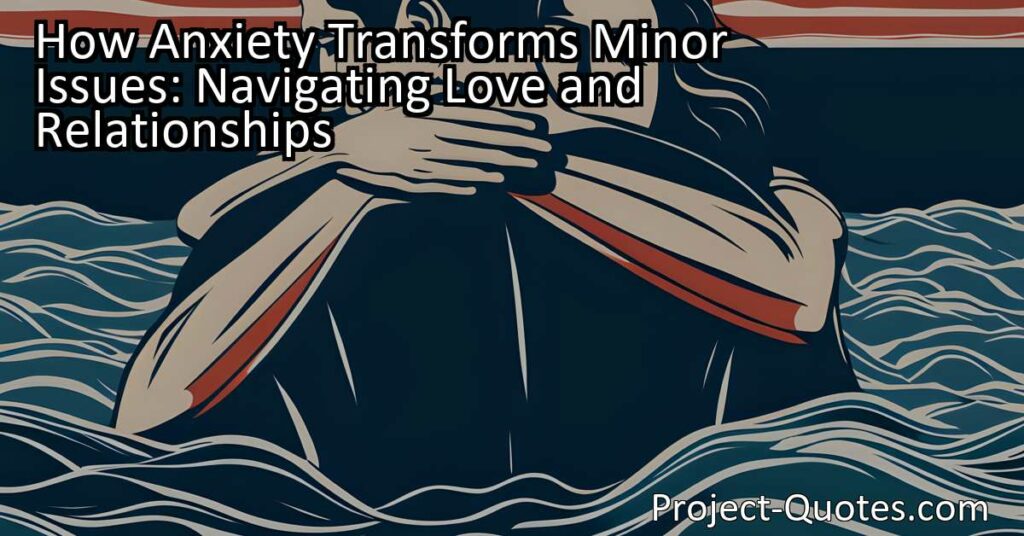Anxiety is love’s greatest killer. It makes others feel as you might when a drowning man holds on to you. You want to save him, but you know he will strangle you with his panic.
Anais Nin
Anxious thoughts often transform minor issues into catastrophic events, causing misunderstandings and conflicts in relationships. This can create a cycle of negativity and hinder genuine connection. By understanding this tendency and approaching loved ones with empathy and compassion, we can work towards stronger and healthier relationships.
Table of Contents
- 1 Anxiety is love’s greatest killer. It makes others feel as you might when a drowning man holds on to you. You want to save him, but you know he will strangle you with his panic.
- 2 Anais Nin
- 3 Meaning of Quote – Anxiety is love’s greatest killer. It makes others feel as you might when a drowning man holds on to you. You want to save him, but you know he will strangle you with his panic.
- 4 Freely Shareable Quote Image
- 5 Related
Meaning of Quote – Anxiety is love’s greatest killer. It makes others feel as you might when a drowning man holds on to you. You want to save him, but you know he will strangle you with his panic.
Anxiety is love’s greatest killer. These powerful words, spoken by the remarkable Anais Nin, encapsulate the often overlooked connection between anxiety and love. In our lives, we experience a range of emotions, from joy to sadness, but it is anxiety that can pose the greatest challenge to love and relationships. Like a drowning man clutching onto a lifeline, anxiety can grip not only the individual experiencing it but also those who care for them, creating a sense of suffocation that is difficult to escape.
Love, by its very nature, is meant to bring joy, comfort, and a sense of security. It fuels our connections with others, allowing us to be vulnerable and open ourselves up to the possibility of deep and meaningful relationships. However, when anxiety enters the picture, it introduces an element of fear and uncertainty that can threaten the very foundation of love.
Anxiety, at its core, is a response to perceived threats or dangers. It stems from a deep-rooted fear of the unknown or potential negative outcomes. While anxiety can be a normal response to certain situations, such as speaking in public or taking an important exam, it becomes problematic when it begins to infiltrate our relationships and hinder our ability to love fully.
When anxiety takes hold, it not only affects the individual experiencing it but also those closest to them. Imagine being in a relationship with someone who is constantly consumed by anxious thoughts and fears. Despite your best efforts to support and comfort them, their anxiety can become overwhelming. You want to help, to be their lifeline, but you soon realize that their panic threatens to drown you both.
Anxiety can manifest in various ways, from constant worrying and overthinking to seeking reassurance and validation. It can create a cycle of negativity that permeates every interaction, leaving both individuals feeling exhausted and emotionally drained. It becomes a delicate dance, where one person tries to save the other, yet the grip of anxiety only tightens, suffocating any attempt at genuine connection.
Part of what makes anxiety so challenging within a relationship is its ability to distort reality. Anxious thoughts often transform minor issues into catastrophic events, which can lead to misunderstandings, arguments, and hurt feelings. What may seem like a small disagreement can quickly escalate into a full-blown crisis due to the anxious mind’s tendency to blow things out of proportion.
Moreover, anxiety can also lead to a lack of trust within a relationship. The constant need for reassurance and validation can create an unhealthy dynamic, where one person feels like they are walking on eggshells, always wary of triggering their partner’s anxiety. This lack of trust and the emotional toll it takes can erode the very foundation of love, making it difficult for a relationship to thrive.
Anxiety not only affects romantic relationships but also friendships and familial bonds. When anxiety enters these dynamics, it can hinder open and honest communication, making it challenging to truly connect and understand one another. The fear of judgment or rejection often associated with anxiety can lead individuals to withdraw or hide their true selves, further exacerbating the strain on these relationships.
However, it’s essential to understand that anxiety does not have to be the end-all, be-all for love and relationships. With patience, compassion, and understanding, it is possible to navigate the complexities of anxiety and build stronger connections.
One of the most crucial aspects of supporting someone with anxiety is to listen without judgment. Giving them a safe space to voice their concerns and fears can provide a sense of relief and validation. Instead of trying to offer quick fixes or solutions, simply offering a listening ear can go a long way in alleviating some of the anxiety’s grip.
Additionally, educating oneself about anxiety and its symptoms can help in understanding the challenges someone with anxiety may face. By learning about anxiety together, both individuals can work towards developing strategies and coping mechanisms that can help manage anxiety’s impact on their relationship.
Building trust is also vital when anxiety is present. It requires creating an environment where both individuals feel secure and supported. Establishing open lines of communication and expressing emotions honestly can help dispel any misunderstandings or fears that may arise.
Encouraging self-care is another crucial aspect of navigating anxiety within relationships. Encouraging activities that promote relaxation, such as exercise, mindfulness, or pursuing hobbies, can help reduce anxiety levels and foster a sense of well-being for both individuals.
Remember, loving someone with anxiety requires patience and understanding. There will be ups and downs, good days and bad days. But by remaining steadfast in your support and striving for open communication, it is possible to navigate the complexities of anxiety and foster a love that can stand against its grip.
Anais Nin’s profound quote reminds us of the challenges anxiety can present in relationships. It highlights the importance of recognizing the impact anxiety can have on both individuals involved and the need for empathy and compassion. By acknowledging anxiety as love’s greatest killer, we open the door to understanding and healing, ultimately paving the way for stronger and more resilient relationships.
I hope this quote inspired image brings you hope and peace. Share it with someone who needs it today!


